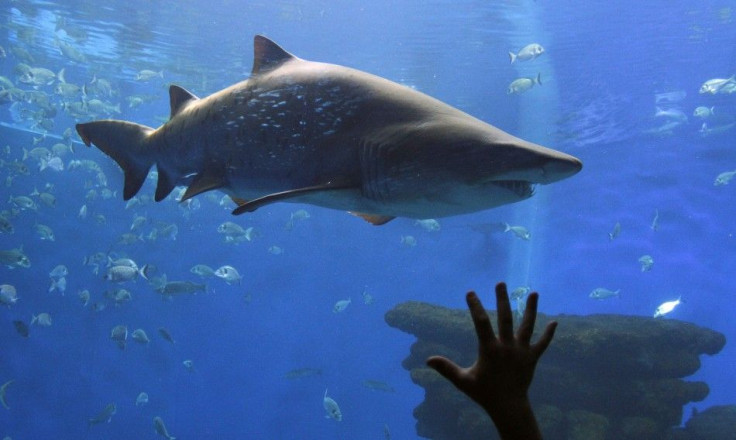2011: A Good Time to be a Shark?

The Marshall Islands, a tiny nation of atolls in the middle of the Pacific Ocean, has now become something of a Mecca for marine scientists, particularly those who study sharks. On Tuesday, the island nation passed a bill creating the world's largest sanctuary for sharks.
In passing this bill, there is no greater statement we can make about the importance of sharks to our culture, environment and economy. I thank President Jurelang Zedkaia for his vision and support for this effort. Ours may be a small island nation, but our waters are now the biggest place sharks are protected. We hope other Micronesian leaders will join with us to make good on our collective promise of a regional sanctuary, said Sen. Tony deBrum of Kwajalein Atoll, a co-sponsor, according to UPI.
The sanctuary, at 768,547 square miles of ocean, is four times the size of California. And it promises to protect not only sharks but also the entire ecosystem of the area, as well as levy large fines on any violators.
Just how important is this piece of news? Consider this. Brazil's Chico Mendes Institute for Biodiversity Conservation, working with the Brazilian Environment Ministry, undertook a study of all 169 shark and ray species found in the country's territorial waters. The study, an assessment of population trends of the sharks and rays, was conducted last year under standards laid down by the International Union for Conservation of Nature.
According to IUCN, of the 169 species assessed, 36 per cent were listed as threatened with extinction, 17 per cent as critically endangered, 4 per cent as endangered, 14 per cent as vulnerable and 9 per cent as merely threatened. Essentially, 80 per cent of the sharks found in Brazilian waters are in danger of being wiped out. And two species were declared regionally extinct. The detailed results of the research will be published in the online journal Brazilian Biodiversity by the end of 2011.
Being threatened with extinction from Brazilian waters is only the tip of the iceberg of problems for sharks worldwide. The biggest threat to the species comes from commercial fishing. In addition to the much-sought after and enormously expensive delicacy that is shark-fin soup (something that is consumed across the world), countries like Australia and India also contribute to the problem. A 2010 report by CNN suggests that approximately 100 million sharks are killed by humans every year.
While the exact number of sharks in the world is not known, common sense will indicate that if we kill a 100 million of them every year, it won't be long before there aren't any around.
It won't be only marine ecosystems that will suffer should the sharks become extinct.
This is bad news for the world's oceans. Sharks are the top predator in the oceans and are vital to its ecosystem. The rapid reduction of sharks is disrupting the ocean's equilibrium, said Peter Knights, director of WildAid International, in the CNN report.
Little wonder then that environmental groups across the board were delighted with the Marshall Islands' initiative.
We salute the Republic of the Marshall Islands for enacting the strongest legislation to protect sharks that we have seen. As leaders recognize the importance of healthy shark populations to our oceans, the momentum for protecting these animals continues to spread across the globe, said Matt Rand, director of global shark conservation at the Pew Environment Group.
In what can only be more good news for sharks, on Sept. 22, Mexico announced that, with effect from next year, the country will ban commercial and recreational fishing of both sharks and rays.
Mexico wishes to share with the international community our intention to declare next year a moratorium on shark and stingray fishing, Yanerit Morgan, a Mexican envoy at the United Nations, told the General Assembly. The New York Times called it the largest initiative by a single nation to protect the shark species.
The U.S. hasn't been far behind either. The Times report added that Oregon, Washington, Hawaii and the U.S. territories like Guam and the Northern Marina islands have all banned the sale of shark fin, while California Gov. Jerry Brown is expected to sign a ban.
All in all, there just may be hope that sharks will continue to swim in the waters of the world, as they have been doing, for so many millions of years so far. After all, that fact alone should buy them our respect and our consideration.
List of Shark Sanctuaries in the World and Their Sizes
Palau - Established in 2009; approximately 230,000 sq m, with 130 threatened species
Maldives - Established in 2010; approximately 90,000 sq m with 30 species
Indonesia - Established in 2010; approximately 17,760 sq m
Cocos Islands - Established in 2011; approximately 3,861 sq m with 30 species
Honduras - Established in 2011; approximately 92,000 sq m
Bahamas - Established in 2011; approximately 250,000 sq m with 40 species
© Copyright IBTimes 2024. All rights reserved.





















